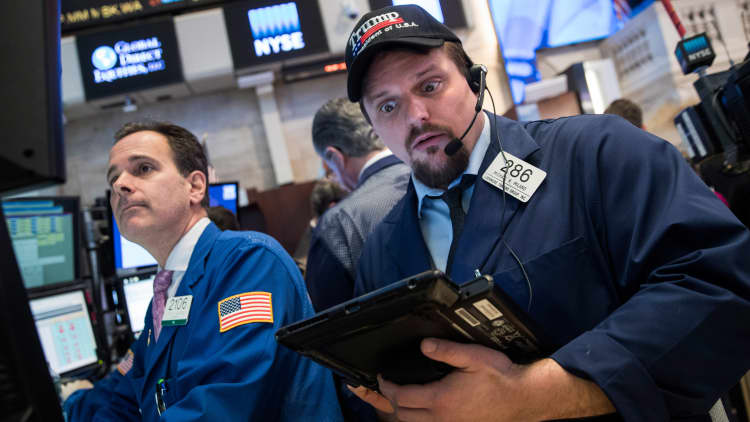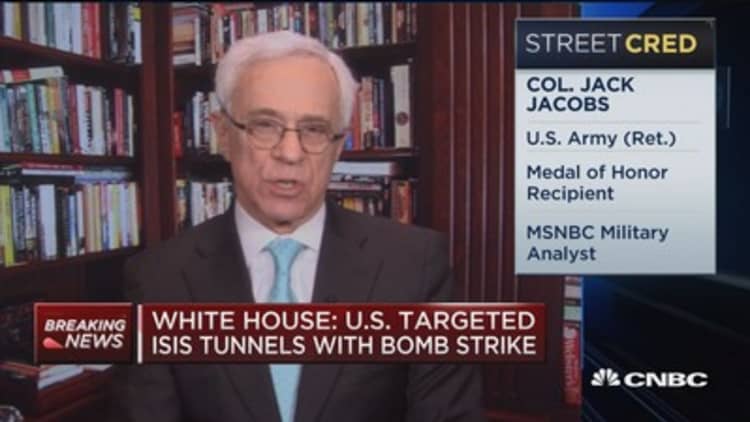
Stocks fell on Thursday after the U.S. dropped "the mother of all bombs" in Afghanistan while bank stocks dropped despite strong earnings from JPMorgan Chase and Citigroup.
The U.S. used GBU-43 bomb on a cave complex believed to have ISIS fighters, according to the Associated Press. The bomb had never been used in combat, according to Adam Stump, the Pentagon spokesman.
Stocks extended losses shortly after news of the bombing broke. The Dow Jones industrial average closed about 135 points lower, at session lows, with Chevron contributing the most losses. The S&P 500 fell 0.68 percent, with energy and financials leading decliners. The Nasdaq composite dropped 0.5 percent.
Defense stock General Dynamics remained in the money. Investors were also nervous ahead of a potential North Korean nuclear bomb test, which could come as early as Saturday.
"People are nervous in front of the long weekend," said Art Cashin, director of NYSE floor operations for UBS. "I would give that about a quarter of the move. The rest of its worries about the financials." The U.S. stock market is closed Friday due to a holiday.
The Financials Select Sector SPDR Fund ETF (XLF) gave back initial gains to close 1.3 percent lower. The ETF has also fallen more than 2 percent this week and gave up its gain for the year on Wednesday.
So-called risk-off trades have been in vogue this week, with gold, Treasurys and the Japanese yen were posting. The three major U.S. indexes, meanwhile, were on pace to end the week slightly lower.
Yen and gold this week
Source: FactSet
Gold futures for June delivery rose $10.40 settle at $1,288.50 per ounce and had gained more than 2 percent for the week. Meanwhile, the benchmark 10-year note yield hit its lowest level since mid-November.
Also, Wall Street grew jittery as it gauged where the Trump administration's priorities were. On Wednesday, President Donald Trump told Fox Business he wanted to repeal and replace Obamacare before moving on to tax reform.
Trump told the Wall Street Journal later on Wednesday he thought the dollar was getting "too strong."
"I'm a proponent of neither a strong nor weak currency but a stable one and believe that we should be careful here in hoping for a weak currency (or just not a strong one which I get) Mr. President," said Peter Boockvar, chief market analyst at The Lindsey Group, in a note.
"Just look at the experience of Japan where consumer spending remains punk and the weak currency hasn't led to any noticeable impact on export volumes," he said.
The comment sent the dollar index to its lowest level of the month against a basket of currencies; it last traded 0.2 percent lower at 100.55.
"That was a surprise because presidents don't usually comment on monetary policy and the dollar. They usually leave that to the appropriate agencies," said Peter Ng, senior FX trader at Silicon Valley Bank.
Also, some prominent investors have come out this week saying the stock market may be overvalued.
ValueAct Capital's Jeff Ubben said Wednesday he is "skeptical" of the market's valuation, adding the firm is returning $1.25 billion to investors. Janus' Bill Gross wrote in his monthly investment outlook that the stock market has "priced for too much hope."
That said, equities have managed to hold their ground somewhat, as they have avoided a major sell-off recently.
"There's been a lot of news over the past few days and we're still in a holding pattern," said Scott Clemons, chief investment strategist at Brown Brothers Harriman. "I think investors are more focused on earnings."
JPMorgan Chase, Citigroup and Wells Fargo all reported quarterly results on Thursday. JPMorgan easily topped expectations, while Citigroup also posted better-than-expected results. Wells Fargo posted mixed results.
"It sort of gives investors some comfort that the high valuations and earnings expectations may be correct," Brown Brothers Harriman's Clemons said.
In economic news, jobless claims came in at 234,000, below expectations, while March PPI declined 0.1 percent. Consumer sentiment came in at 98, beating expectations.
Major U.S. Indexes
The Dow Jones industrial average fell 138.61 points, or 0.67 percent, to close at 20,453.25, with Chevron leading decliners and Visa the top advancer.
The pulled back 15.98 points, or 0.68 percent, to end at 2,328.95, with energy leading all 11 sectors lower.
The Nasdaq declined 31.01 points, or 0.53 percent, to close at 5,805.15.
About three stocks declined for every advancer at the New York Stock Exchange, with an exchange volume of 778.57 million and a composite volume of 3.131 billion at the close.
The CBOE Volatility Index (VIX), widely considered the best gauge of fear in the market, traded near 16.
—CNBC's Patti Domm and Reuters contributed to this report.
On tap this week:
Friday
U.S. markets closed
8:30 a.m. Retail sales
8:30 a.m. CPI
10:00 a.m. Consumer sentiment
10:00 a.m. Business inventories
Watch: We dropped a very large bomb, says Colonel



